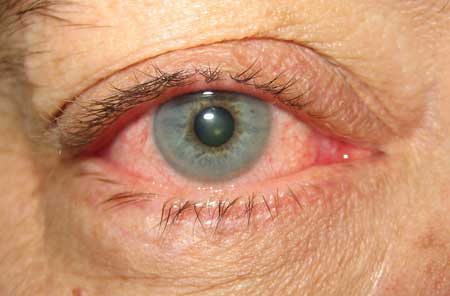Last reviewed: 16 Mar 2025
Last updated: 21 Nov 2024
Summary
Definition
History and exam
Key diagnostic factors
- watery discharge
- ropy, mucoid discharge
- purulent discharge
- itching predominant symptom
- red eye
- eyelids stuck together in morning
- tender, preauricular lymphadenopathy
Other diagnostic factors
- conjunctival follicles
- chemosis
- swollen eyelids
- superficial punctate keratopathy
- unilateral symptoms and signs
- use of medications that may lead to eye irritation
- contact lens use
- corneal subepithelial infiltrates
- corneal pannus
- vesicular skin rash
- symptoms and signs of related systemic disease
Risk factors
- exposure to infected person
- infection in one eye
- environmental irritants
- allergen exposure
- concurrent infection
- camps, swimming pools, military bases
- hot, dry climate
- atopic dermatitis
- contact lens use
- ocular prosthesis
- trauma: mechanical, chemical, or ultraviolet
- recent surgery or exposed sutures
- rosacea
- allogeneic stem cell transplantation
- Stevens-Johnson syndrome/toxic epidermal necrolysis (TEN)
- prior infection with herpes simplex virus
- in neonate: vaginal delivery
- oculogenital spread
- asthma
- hay fever
- use of topical eye medications
- use of oral antihistamine or anticholinergic drugs
- neoplasia
- history of rheumatologic disease
- dysthyroid states
- immunocompromised state
- vasculitis
- nasolacrimal duct obstruction
- abnormality of supporting structures of the eye (adnexa)
- severe tear deficiency
- trauma
- use of biologic agents
Diagnostic tests
Tests to consider
- cell culture
- special stains (Gram, Giemsa)
- polymerase chain reaction
- ocular pH
- allergy skin testing
- tear immunoglobulin E level
Treatment algorithm
Contributors
Authors
Robert Sambursky, MD
Fellowship-Trained Ophthalmologist
Manatee Sarasota Eye Clinic & Laser Center
Bradenton
FL
Disclosures
RS is employed by Verséa Ophthalmics and serves on the board of Visus Therapeutics.
Acknowledgements
Dr Robert Sambursky would like to gratefully acknowledge Dr Lee Raykovicz, a previous contributor to this topic.
Disclosures
LR declared he was Director of Clinical Relations, Rapid Pathogen Screening, Inc.
Peer reviewers
Michael Ehrenhaus, MD
Director
Cornea, External Disease & Refractive Surgery
Long Island College Hospital Eye Center
Assistant Professor of Ophthalmology
SUNY Downstate Medical Center
Brooklyn
NY
Disclosures
ME declares that he has no competing interests.
Scott Fraser, MD, FRCS (Ed), FRCOphth
Consultant Ophthalmologist
Sunderland Eye Infirmary
Sunderland
UK
Disclosures
SF declares that he has no competing interests.
Use of this content is subject to our disclaimer
